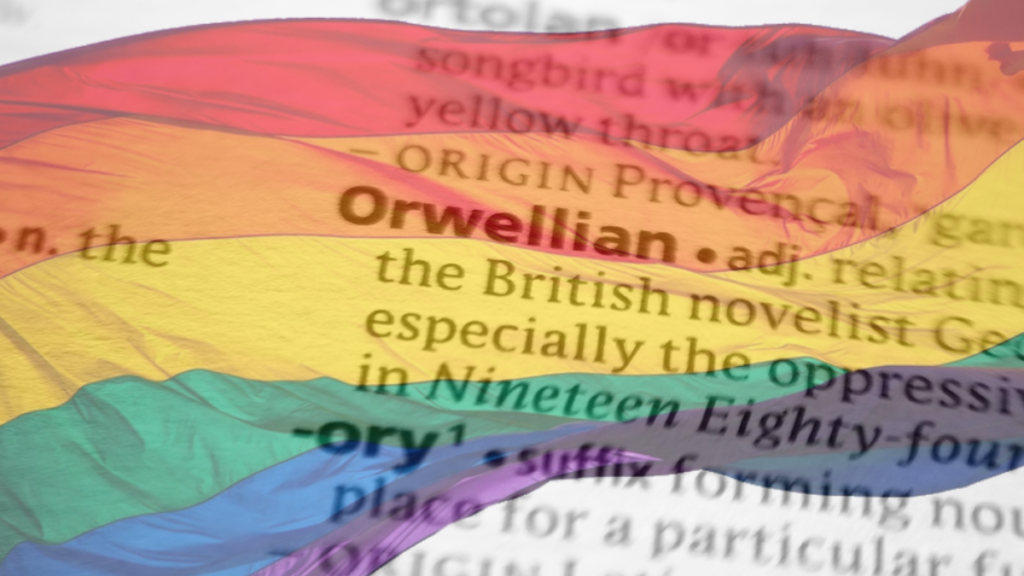“Don’t you see that the whole aim of Newspeak is to narrow the range of thought? In the end we shall make thought-crime literally impossible, because there will be no words in which to express it.”
This is how the character of Syme, in George Orwell’s 1984, explains to Winston his work on Newspeak at the Ministry of Truth. Cultural critics have oft remarked upon the prescience Orwell had in imagining aspects of totalitarianism, especially the “soft” totalitarianism that has begun to emerge most recently in society. This week’s hearings for the Supreme Court appointment of Judge Amy Coney Barrett have brought yet another chilling example of a scenario that Orwell himself might have dismissed as implausible and far-fetched, but in reality is a daily occurrence in the “new normal” pushed by progressive ideologues.
During questioning at Tuesday’s hearing, Democratic Senator Mazie Hirono (HI) upbraided Barrett for using the phrase “sexual preference” in speaking about LGBT issues—a “thought crime” for which the Judge quickly apologized, explaining she did not intend any offense. Many viewers of the hearing, though, were just as puzzled as Barrett seemed to be—since this was the first many of us have ever heard that “sexual preference” is considered “offensive.”
MSNBC producer Kyle Griffin quickly tweeted out a quotation of Hirono’s words, “Sexual preference is an offensive and outdated term. It is used by anti-LGBTQ activists to suggest that sexual orientation is a choice. It is not. Sexual orientation is a key part of a person’s identity.”
Of course, the fact that there do seem to be some people who change with regard to their sexuality—who at different times in their lives might “identify” as alternately “bisexual” or “gay,” for example—seems to be no useful argument against this re-conception of the term “sexual preference.” The reason? Because LGBT activists will simply create a new Orwellian neologism to cover such awkward facts: “sexual fluidity,” for instance. In this and so many other things, if facts and data and science ever seem like they may hinder the LGBT cause, the path is clear: it would be laborious and embarrassing to admit the contradiction, so it’s much easier to define—that is, re-define—the contradiction out of existence. Such it was with the redefinition of “marriage” to include unions of same-sex partners. Such it has been more recently with the redefinition of “sex” or “gender” to mean something “expressed” in attitudes, feelings, or actions rather than something expressed in genetic code. Is it any wonder, then, when people are deemed capable of changing their biological sex from the one “assigned at birth” to one they’re more “comfortable” with, that we see such alacrity in the changing of language?
Is this too harsh an indictment of progressive sexual activism? Well, consider this: yesterday, quietly, Merriam-Webster updated its online dictionary entry for the word “preference” to reflect the “new normal.” Unfortunately for Merriam-Webster, though, the change was noticed by some keen eyed Twitter users, including Steve Krakauer (Executive Producer of the Megyn Kelly Show):
Krakauer noted that the 5th sense of the word given in the dictionary had a new online instance, caught by the internet archive suddenly on October 13, 2020: the very day of Hirono’s exchange with Judge Barrett.
Formerly, the definition of “preference” included a 5th sense that held the word to be simply synonymous with “orientation” when used in this way, i.e. “sexual preference.” The update discovered on Tuesday, however, changes the entry to say this usage is “offensive,” explaining in a “usage note” that, “The term preference as used to refer to sexual orientation is widely considered offensive in its implied suggestion that a person can choose who they are sexually or romantically attracted to.”
It is unclear whether this change actually occurred during or shortly after Tuesday’s hearing, or if somehow the internet archive’s scrubbing of the page on this date was coincidental. What is beyond dispute in any case, however, is the plain fact: only one month prior to Hirono’s berating Judge Barrett for using the term “sexual preference” in a particular way, that way had literally been part of the dictionary definition of the term.
“The whole aim of Newspeak is to narrow the range of thought.” A dictionary definition from September 2020 is held in October 2020 by a United States Senator to be simply unthinkable and—quote—an “outdated term.” It’s a piece of work that would have made Orwell’s Syme proud. But it would’ve made Orwell himself, and his protagonist Winston—and it should make all of us—shudder with alarm. What will they redefine next? And how fast?
